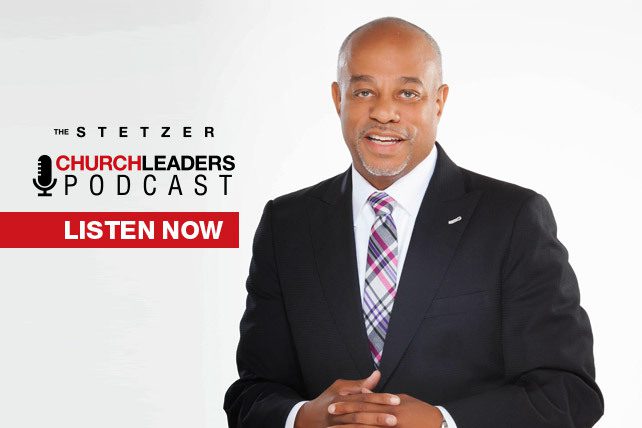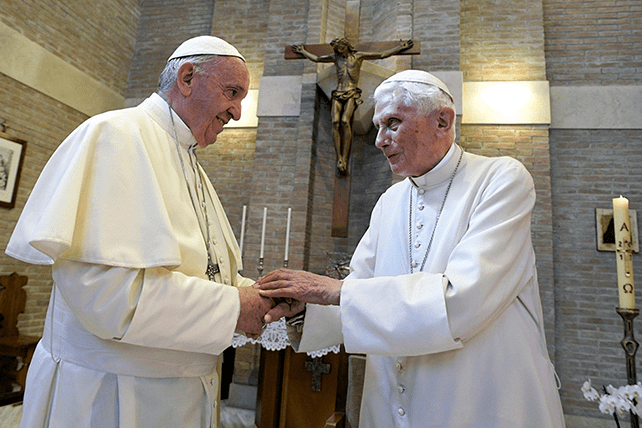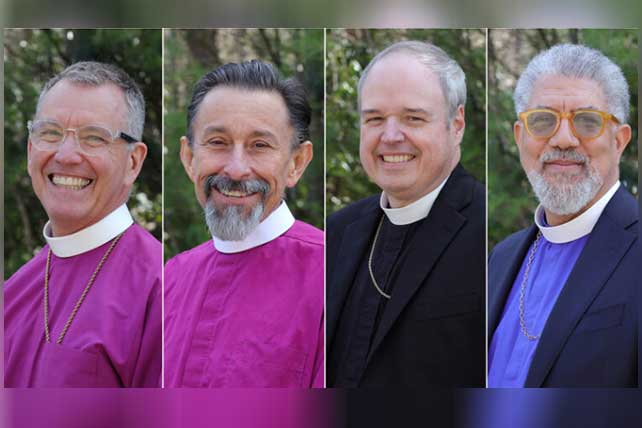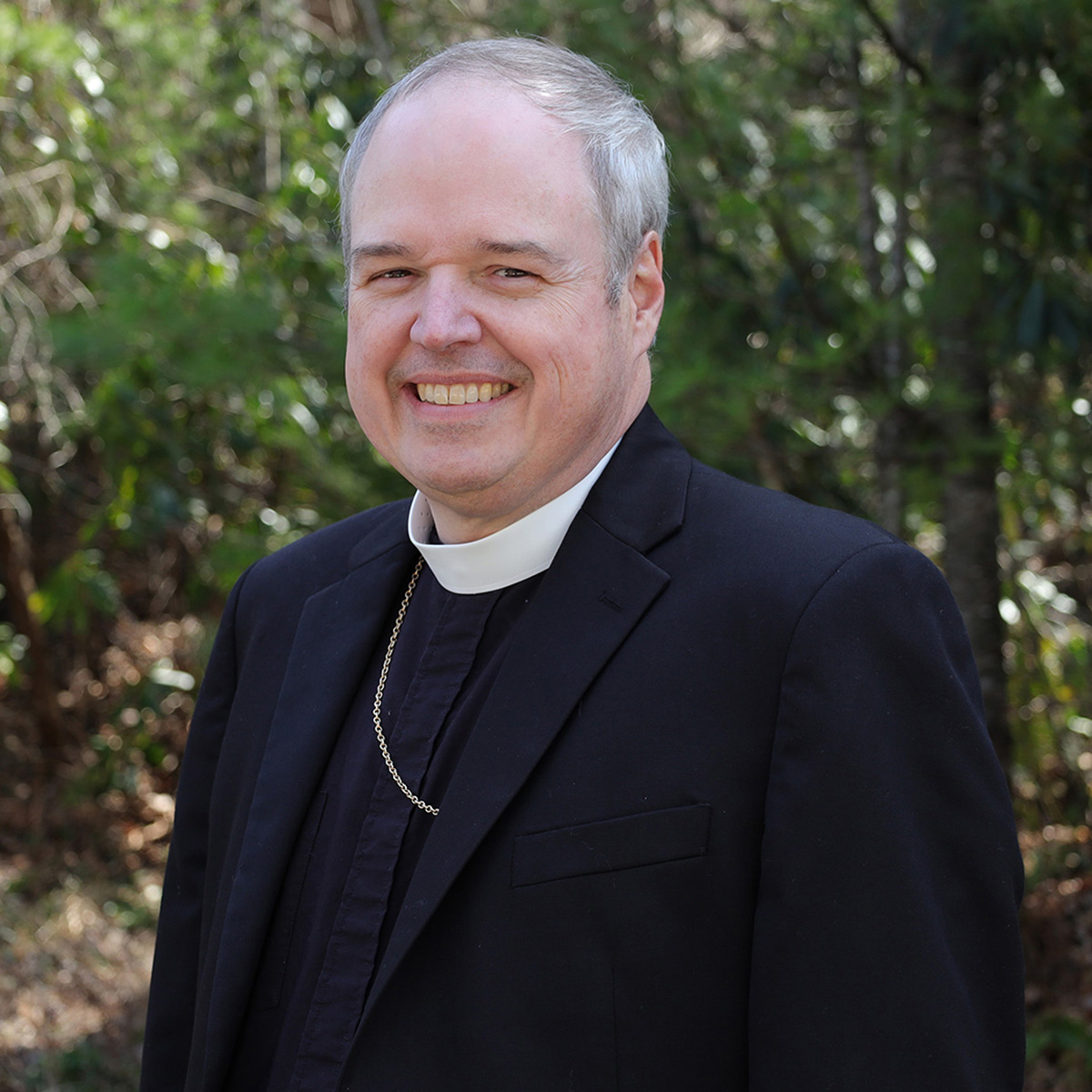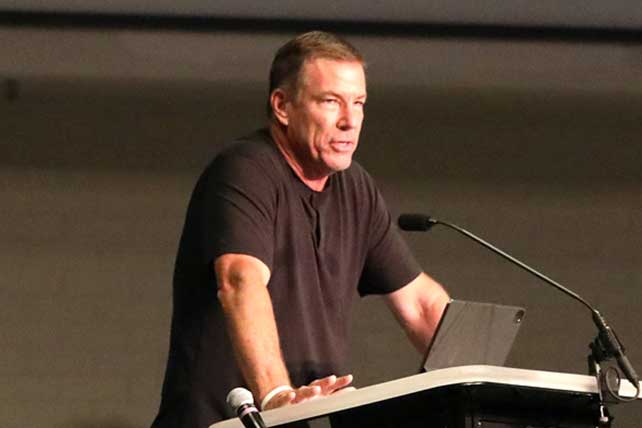John Jenkins on The Stetzer ChurchLeaders Podcast.mp3: this mp3 audio file was automatically transcribed by Sonix with the best speech-to-text algorithms. This transcript may contain errors.
Ed Stetzer:
The sets are. Church Leaders Podcast is part of the Church Leaders Podcast Network, which is dedicated to resourcing church leaders in order to help them face the complexities of ministry. Today, the Church Leaders Podcast Network supports pastors and ministry leaders by challenging assumptions, by providing insights and offering practical advice and solutions and steps that will help church leaders navigate the variety of cultures and contexts that we’re serving in. Learn more at Church leaders.com/podcast network.
Voice Over:
Welcome to the Stetzer Church Leaders Podcast, conversations with today’s top ministry leaders to help you lead better every day. And now, here are your hosts, Ed Stetzer and Daniel Yang.
Daniel Yang:
Welcome to the Stetzer Church Leaders Podcast, where we’re helping Christian leaders navigate and lead through the cultural issues of our day. My name is Daniel Yang, national director of Churches of Welcome at World Relief. And today we’re talking with John Jenkins. John is the pastor of First Baptist Church of Glenarden in Maryland, board chairman for the National Association of Evangelicals, and the president of converge, a movement of over 1600 churches who start and strengthen churches and spread the gospel worldwide. John is the author of Grace to Grow Creating a Healthy Church in Unhealthy Times. Now let’s go to Ed Stetzer, editor in chief of Outreach Magazine and the dean of the Talbot School of Theology.
Ed Stetzer:
Well, John, super excited to have this conversation with you today. And you know, some of your story is both a great opportunity. Probably why they had you write a grace to grow, creating a healthy church and unhealthy times. It also can be intimidating to people. And so I want to kind of talk because it’s like, you know, people will say, well, I don’t I’m not leading a church of that size. I’m not the chairman of the board of any. I’m not the head of a denomination. And you happen to be all of those in addition to being a local church pastor. But I really I like I like the book a lot, I endorsed it. I particularly like kind of how you built towards some key themes. But let’s start with because I’ve already heard the introduction, let’s start with a little bit. How do you, at this stage in your life and leadership, manage all that you do?
John Jenkins:
You know, that’s a great question. Uh, and I think I’ve done a couple of things. Number one, I’ve tried over the course of time to hire the best people I can find. You know, I don’t want everything stopping at my desk. I think that’s one of the mistakes that a lot of pastors make, that everything has to come to their to their table, to their desk. I try to empower others to do the work. I try to hire the best. As a matter of fact, I try to hire people that are more qualified than the position calls for, and in the long run, that has served me well. And so having good quality people on staff has empowered me to be able to be free to do some other things.
Ed Stetzer:
Okay. And so and again, we’ve heard about some of those other things and the complexity of that. Okay. So but to the book so Grace to grow which is about creating a healthy church in unhealthy times. And it is a it is a book geared towards pastors and church leaders. Our audience is pastors and church leaders. And there’s some key things I wanted to talk about that early on. You did. Before you say.
John Jenkins:
That, can I just add a thing because because even not even business people, there are principles in here that I think are helpful.
Ed Stetzer:
I think so to our business people aren’t generally listening to our podcast. But I agree with you. I agree with you. Um, so one of the things you sort of weave your story through this as well, which is what a good book is. Um, but talk to us a little bit about early on about the clarity of knowing your vision and mission. That became a key thing for what you do.
John Jenkins:
People got to know where they’re going. What, what what is the ultimate destination of this train? If I’m going to get on board the train, where is it that we’re going? And that is something that we we were able to shape in the very early stages of my pastorate. And by the way, this is my home church. I grew up in this church, and even before I became the pastor, there are things I thought about that I would do if I ever became a pastor. And when I became the pastor, I was able to incorporate those things. But I think it’s critical for, uh, churches and pastors to have a simple vision, not a not a paragraph or two long, something very basic that people can remember and re they should be able to communicate the church’s vision on an elevator, you know, going they call it the elevator speech, you know, be able to go up on the elevator and be able to explain it to somebody to inspire them. By the time I’ve been on.
Ed Stetzer:
An elevator at your church, right in that back in that building in the back with, I think some of your leaders and could articulate some of those things. So what I mean, early on, the church was much smaller. What was the articulated vision that you drew people toward?
John Jenkins:
The main deal was discipling people. The fact that we’re we’re we’re discipling people who will in turn disciple people. So it boils down to getting discipled and then taking what you’ve learned and worked into your life and replicating it in the lives of others. Okay.
Ed Stetzer:
So, um, one of the things you’ve I heard you talk about, you’re actually in LA to meet with one of the pastors, one of the churches you cover. Now, that’s not as common thing. Let’s just talk about it’s more common in the black church than it is in the white church kind of context. Or, you know, whatever else, the expressions may be an Anglo expression. So the reason I want to ask you that, first, explain it for a minute, but then I want you to explain how you talk to the pastors you cover who are not pastoring 10,000 people on a weekend about some of those issues, but to explain the whole covering thing.
John Jenkins:
Yeah, basically, it’s a simple concept. Covering means that I pastor pastors. That’s what it means that the pastor has a pastor. The pastor has someone to whom he is accountable to and submitted to. Those are the key points there. And, um, I believe that regardless of the color of a person’s skin, every pastor should have a pastor somebody they can depend upon, rely on, be honest with, and, and are submitted to. So, um, that’s what covering means. And, um, I have not always pastored a large church. I pastored a little small country church in outside of Richmond, Virginia, halfway between Washington, D.C. and Richmond, Virginia, maybe 30 people on a on a Sunday on average. And, um, you know, I learned a lot in that little small church. I learned how to influence people, how to engage with people. And so I took those lessons and brought it back to my home church, where I’m so.
Ed Stetzer:
And it seems like for most people, Elmer Towns once taught me this, that everyone needs a church to learn on. And so you had a church to learn on. And then he said, you need a church to. To lead through and then one to live your dreams through. So he you know, he would say there’s three, but okay. But why? Because I like the idea. Like I have people that would speak into my life, but outside of maybe some Pentecostal charismatic streams and in historic black churches, I don’t hear the language of covering per se. So you want to exhort people towards that? If I wanted that in my life, and I have that with some people, but not, like, not in the same way, because I’m a, you know, a dean and stuff like that. How would you say this is how you should approach someone and ask them to cover you and speak into your life?
John Jenkins:
I think it needs to be somebody that you do have a relationship with that knows you, that sees you, that has the opportunity to see you and mentor you and challenge you and rebuke you when you need to be rebuked and encourage you when you need to be encouraged. So I think that’s an important thing that you pick out somebody who you who knows you, who loves you and cares about you, and you should say, hey, I love. I love how you have loved on me. You know, I would approach a person and say, would you be willing to be my pastor or be willing to be my covering, be.
Ed Stetzer:
My pastor, be my covering pastor’s language? My. Okay, so I’ve spoken to you, the pastors that you cover had a wonderful time in their churches and their leaders. And I, they’re very and it was during Covid. So we were doing a lot of this online. Um, but again, there’s all kinds of church sizes that are there. So right now you can stand up in front of your big church and Maryland and cast a vision, but you did it when you were 200 people too. So. So what advice do you give to the pastors you cover about articulating vision and mission?
John Jenkins:
So it’s got to be basic. So I said that before short not, you know, paragraphs long and it has to be repeated over and over again. It has to be taught. I made the mistake once of thinking that once I told the church once or twice that they got it. And I would say to pastors, it’s important to keep repeating it, put it on banners, put it on signs around the church, talk about it. If you come to First Baptist Church of Glenarden, you’re going to hear it. When we open the service, you’re going to hear it when we welcome our guests, you’re going to hear it in our our announcements are done by videos. You’re going to hear it there. We repeat it over and over again. It’s taught. So I think the key is once you once you figure out what it is, that is the vision and mission statement. And by the way, I interpret that the vision is what you want to see. The mission is how you’re going to make what you want to see happen. That’s how I interpret.
Ed Stetzer:
Vision is what you want to.
John Jenkins:
See, to see in the.
Ed Stetzer:
Future. And the mission.
John Jenkins:
Is how you’re going to make it. Okay.
Ed Stetzer:
So you mentioned just being making disciples that make disciples. Where’s the which is the mission, which is okay.
John Jenkins:
So our vision statement is developing dynamic disciples. That’s our vision. Our mission attached to that developing dynamic disciples is through discipleship, discipline and duplication. Nice. It’s all DS. Yeah, of.
Ed Stetzer:
Course, because we’re Baptists. So we got to alliterate for sure. Right. Exactly. And what percentage of the leaders in your church, the leaders, not the everyday attendees, could articulate the mission and the vision like that 100%. Okay. And you actually will ask them.
John Jenkins:
Absolutely. Yeah. If they they would know that they would know. They didn’t know that they would no longer be.
Ed Stetzer:
That’s right. That’s like a test of their we’re actually in the process right now of building values at the Talbot School of Theology. And I’m working you know, I just sent it out to everybody. We’re doing it collaboratively because I came into a large organization. But I do expect people to like, know and to really measure by some of those values. Okay. So vision and mission. And again, if you get grace to grow, creating a healthy church and a healthy times, they’ll get more information on that. But one of the early things too is, I mean, we’ve known each other. I mean, we’ve been pretty close for for probably five plus years and knew each other for longer than that. I’ve seen you lead in a meeting. I’ve seen you at one time. I called you after a meeting where I watched you say, we’re going to not do that again. You know, I’ve seen you redirect a meeting and do things of that sort, but you’ve built a sense of integrity that people trust you. And really, one of the I mean, chapter three and you go on for about a while is the importance of establishing integrity in leadership. Talk to us about that.
John Jenkins:
So integrity is important. It means that you’re going to you’re actually going to do what you say you’re going to do. You’re going to be what you say you’re going to be. Um, I, I am I hate this, I hate to say what I’m about to say, but, you know, I think a lot of pastors can’t be trusted to do what they said they’re going to do. Yeah. Um, they say they’re going to come to a meeting and don’t show up. They say they’re going to do something. Don’t do it. Integrity. Keep your word, even if it costs you, even if it’s going to be painful to you, even if it’s going to embarrass you, do and be what you said you’re going to do.
Ed Stetzer:
And that’s people when you mentioned when it’s hard, that’s when people notice and they trust you. When you’ve kept your word, when it’s difficult, when it’s hard and it’s little things. I love that you’ve kind of pointed to some little things. And when you lose that man, it’s one thing. Undo undoes ten positive things and one negative thing. Okay, so but there have been times when people would question your integrity. You know, for every pastor, every church leader. So how have you managed and walk through that? You’ve been doing this for decades. Yeah.
John Jenkins:
You know I. Think when when people question me or challenge me. First thing I do is evaluate whether there’s any truth to the statement.
Ed Stetzer:
So really try to receive and listen to it. Make your critics your teachers.
John Jenkins:
Is there any truth to it? Or what? What have I done to make a person feel that way or think that way? So it’s a self examination point. And there have been times when people have challenged or said something to me, and I needed to bring some correction to myself. But there have been other times when what they said wasn’t true. And so you got to be wise enough to recognize when they’re saying something that’s not true. Uh, and continue in the path.
Ed Stetzer:
But that takes an open heart to actually do that. That makes that makes a difference. And it comes in chapter five of Grace to grow. You talk about may your motives pure and that relates to that. So talk to us expound a little bit what you mean by make your motives pure in leadership.
John Jenkins:
So, you know, one of the things that, uh, reasons that people want to build a big church is they want the, uh, the trappings that go along with it. They want the the money, they want the big house and the cars. Those are not pure motives. God wants us to do what we do for his glory. He wants us to do what we do to advance his kingdom and to advance his name, and not our own name. Impure motives would be you’re trying to make a name for yourself. You’re trying to make money. You’re trying to be famous. Those are not pure motives. And so I’m challenging people. Let your motives be pure for why you do what you do.
Ed Stetzer:
Yeah. And you, we just recently had you on campus, along with several other African American leaders, and we hosted. Everyone was welcome, but predominantly African American pastors, leaders here at the Talbot School of Theology on Biola University campus. And you talked about that. You spent a lot of time talking about that because, I mean, the stats show that pastors are like increasingly and it’s all institutional leaders, it’s teachers, it’s bankers, but it’s still pastors. And so we’re starting with a trust deficit that was different than when you started. So you’ve seen in your lifetime, in my lifetime, 30 years ago, pastors on the high side now, pastors on the low side starting I mean, right now, your church trusts you implicitly, right? They love you. They trust you. But many people listening, they’ve been there a year. Maybe they’re just starting. How would you find the place to build that trust if you were starting again?
John Jenkins:
Yeah, I think, you know, you build that trust by, again, the integrity piece, keeping your word. I think you build it by showing people that you genuinely love and care about them. I look for opportunities to show my love to people, to show care, and there’s little things you can do for that. I, I try to track birthdays and remember people’s birthdays and give them a call. I’m sure that’s how I showed them love. Uh, if I hear they’re going to have surgery or something like that, I try to make an effort to, um, show them that I’m caring for them, uh, by praying for them or visiting them in the hospital or doing some sort of a pastoral thing to show them that I really, genuinely, you.
Ed Stetzer:
Know, you can’t do that unless you’ve mastered delegation to have the time and space to that. It’s a bit of a cycle that’s ultimately there. I try to leave, carve out some room so I can meet the needs of my faculty and staff in crisis, but that also means I’ve got to carve out some space. I don’t know when that’s going to come, so that’s not always easy. So it comes back. It’s all a cycle of leadership. Yeah.
John Jenkins:
So and that’s true. And what I did early on in the church, I did that early when the church was small. But you have to adjust that as the church grows has the people you’re responsible shifts. Uh you have to shift that. And so what I’ve done is I’m right now I concentrate on pastoring the leaders of our church. Sure. Yeah. Right.
Ed Stetzer:
So if there’s someone, you know, someone in a leadership team, they’re going to know they’re going to hear from John. But probably somebody who’s a member of the church may hear from one of the leaders. That’s right.
John Jenkins:
Who’s know? Probably they will. Right?
Ed Stetzer:
Right. For sure.
John Jenkins:
Matter of fact, uh, I, we teach the people when they first come in. Don’t expect the pastor to come see you in the hospital unless you’re dying. Yeah.
Ed Stetzer:
You don’t want the pastor to come see you if the pastor shows up, you are not doing well.
John Jenkins:
Uh, I went to I was visiting somebody in the hospital once, and I stopped by another person. This room that was there and they said, pastor, please don’t come in here.
Ed Stetzer:
Let’s pray. But but again, you’ve taught an expectation. So it’s not that you’re not providing care to people, it’s you’re providing care to a different set group of people. Absolutely. And you articulate that along with the mission. They sort of know. I’ve often said it’s hard for people because people, you know, some of those people want to have their pastor meet all their needs. But my concern is that people’s needs are met, not that the pastor meets all their needs. And I think both can be true. Um, so you wrote the book, and one of the things that I loved about it was when you brought evangelism to a separate chapter, because you didn’t have to do that. It’s not a book, really. I mean, it’s discipleship. Leadership is all woven throughout. But you brought evangelism to the front, and I know we’ve journeyed through some of that together. So talk to us a little bit about that, how your leadership relates to evangelism.
John Jenkins:
So, you know, I thank you for asking that question because I have a passion to train, to help train churches and pastors how to develop a culture in their church of evangelism. Our. Church grew drastically over the years. I’ve been there for 34 years, my 35th year, and it’s grown. And that evangelism training helps keep the church vibrant, helps keep people leading people to the Lord. And so every member of our every leader in our church, you cannot be a leader in our church. And you have not completed the training of how to win somebody to Jesus Christ. So we use Romans Road in Romans.
Ed Stetzer:
Road is is old school. How come you’re using old school? We all have fancy evangelism things. We’ve got a apologize half the time for sharing the gospel. We got to back up and kind of work our way around it. Romans Road, that’s just that’s just old school is old school.
John Jenkins:
But it’s easy, okay.
Ed Stetzer:
Because it’s it’s easy. You can open your Bible, walk through.
John Jenkins:
It from the same book. All the verses are right there in Romans, and we can easily train people on how to do that. It’s so simple, I think.
Ed Stetzer:
I think it was a long time ago. I think that Romans Road, because I remember a couple of verses of Romans, I think that’s what someone was sharing with me. But but one of the things I like about your church, you’re in you’re in a complex area. Um, I mean, I don’t know if I’m allowed to say this on the recording, but you used to work for the CIA, so you understand complexity. We can edit that out if we need to, but don’t tell us anymore, because I know you’d have to kill us. Um, and you’re in an area that’s complex, culturally, politically, all those sorts of things. You can do nuance. But when it comes to evangelism, you’ve chosen to do simplicity and focus. Absolutely. So how do people respond to that? When we lay that out, the.
John Jenkins:
People love it. Okay. Uh, it’s the evangelism training in our church is one of the one of the classes that fills up first, really in our church. Okay.
Ed Stetzer:
That’s unusual for churches.
John Jenkins:
Yeah, it’s because it’s the heartbeat of our church. It is. It is what we’re about. And, you know, we try to help people understand. We’re trying to get your sons and your daughters saved. We’re trying to get your grandchildren saved, your cousins, your relatives, your friends. We’re trying to get them all in the kingdom of God before it’s everlasting. Too late.
Ed Stetzer:
You know, when we did when we did this event on campus here, um, lessons from the journey, we called it, I put in there and I said, you know, I mean, the African American church has been thriving often on the margin for centuries. And I think that, you know, people in other traditions and cultures and contexts can learn from that. But one of the things to learn is that focus on drawing women and men to the good news of the gospel. Absolutely, I love that. And how has that played out in the church? I’m asking you to share a little bit about how people are coming to Christ at First Baptist Glenarden.
John Jenkins:
So, you know, like like we train our members how to engage people in spiritual conversations and lead them to the Lord. Sometimes people come to our church and join our church, but they already got saved at somebody’s house. They already got saved because.
Ed Stetzer:
Someone’s letting the Lord in that relationship. That’s right.
John Jenkins:
They engage him in conversation. So that’s a big heartbeat of our church is helping train people to lead others to the Lord.
Ed Stetzer:
And you’re seeing that happen, people? Absolutely. Absolutely. Baptisms. Absolutely, I love that, I love that, and to see how the Lord’s worked in your church has been fascinating to me, just as as an outsider kind of. On that journey, we actually started together, the African American Church Evangelism Institute at the Billy Graham Center. I’m not there anymore. The work continues with you and Rick Richardson and the team there, and people want more information. We’ll link it all in the program notes for the good.
John Jenkins:
Yeah. And I would just strongly encourage them, whether you’re African American or not. Get connected. Yeah for.
Ed Stetzer:
Sure. We have a church. I’m actually promoting this stuff from the last place I work, because I really love what we did there at the Billy Graham Center. Some good some good stuff. Okay, I’m skipping things. And I think that people want to get grace to grow. Creating a healthy church in uncertain times, unhealthy times. I think they kind of Hitler. For example, you talk about worship and things of that sort. I’m skipping a lot of stuff and I want to encourage people to get the book. But let’s talk about understanding and teaching discipleship, because you make an emphasis of there’s there’s almost a distinction you can understand, but you got to teach, you can teach, but you got to understand. So why both of those things be important?
John Jenkins:
Because what discipleship means you’ve worked something into your life. I like that a class you can get exposed to the information and pass the test, but never work it into your life and I view the the difference between teaching and discipleship is the fact that once you learn it and work it into your life, then you’re a disciple, then you’re being discipled. So I in our church we have classes, but we also have a lot of discipleship groups. Okay, tell me the.
Ed Stetzer:
Difference between classes and discipleship classes.
John Jenkins:
You just get the information.
Ed Stetzer:
You come to the class on Tuesday or whatever, you.
John Jenkins:
Read the book, you take the test and discipleship. Once you get exposed to something that next week, you have to apply it to your life.
Ed Stetzer:
So you’re taking a study and then you’re doing certain things. Pray this day. Memorize this, that kind of thing. That’s right.
John Jenkins:
Okay. Because, you know, we got all kinds of discipleship classes men, women, uh, youth, young adults, couples, finances, all kind of areas. But once you learn the principle, you apply that week, and then you come back the next week, and you have to give an account to the members in your discipleship group, what you did and whether you applied it and if it did work, what you did. If it didn’t work, why didn’t it work? How can we help you get it working?
Ed Stetzer:
How do you move people toward. Towards discipleship classes. But let’s even start at the beginning. I know if you’re doing evangelism, is there a membership class and then after that or not, that is there a discipleship class? What’s the how do you get people in that space just announce from the pulpit? Or is there like an expectation?
John Jenkins:
That’s a great question. Let me let me just try to answer that. So we started our discipleship group by me inviting the pastor. The senior pastor invited seven men to go through a three year discipleship program that met on Saturday mornings at 7:00. Let’s let’s slow.
Ed Stetzer:
The bus down for a second three year discipleship program at 7 a.m.. That was.
John Jenkins:
Our first.
Ed Stetzer:
You shared this at the conference, so I’m glad you’re sharing it here, because I really love that. And people in the room when you share that a couple of people looked at each other and said, I don’t know if they can do that, but keep going.
John Jenkins:
So, uh, I invited them. Yeah. Personally, personally, personally.
Ed Stetzer:
The church wasn’t thousands at this point. Oh, no, no.
John Jenkins:
No, we probably had 300 people at that point. And we invited them to come to that training when they when we finished after three years, um, I asked them to give me the names of people that they thought could benefit from that same training and that same discipleship. And that’s how we started our discipleship program. Now, all of our discipleship programs don’t do that today. Right? But there are some.
Ed Stetzer:
I can’t imagine you’re meeting people 7 a.m. every day for three years in a group. You must have multiplied that.
John Jenkins:
Yeah, that’s right. We have other people that do it. I’m not doing it, but we’ve trained other people to do it. But the key here is if we had just made an announcement on Sunday morning, we’re having a three year program for discipleship, 7 a.m. on Saturday morning. Sign up in the back. Ain’t nobody signing up for that, right? But the fact that the senior pastor invited people to it to be a part of it was a strong point of people wanting to be in it.
Ed Stetzer:
Do you at that time, did you have a curriculum is just do it on the floor? We did have a curriculum, yes. Your own. You wrote it yourself.
John Jenkins:
No, no, it was a book that we got from another ministry.
Ed Stetzer:
Okay, okay. And there’s lots out there now, you know, 50 years ago, not so much, but now. And you know what? I think the best discipleship curriculum is one that you’ll do. So, you know, I’m for 2.7. I’m for, you know, we got Master life. There’s all kinds of things you can do. Yes. But so you leaned in on that and created a discipleship culture. So now somebody shows up. I’m new at First Baptist Church, Glen Arden. How do I now get into discipleship? Say, if you’re new, if you’re new at our church, you want to ask you to blank what’s the pathway?
John Jenkins:
So there is a path. We want you to complete the new members class. We want you to go through the Alpha training the Alpha to expose you.
Ed Stetzer:
To Alpha, the evangelism course. The well-known evangelism.
John Jenkins:
Course. Yeah, yeah, yeah.
Ed Stetzer:
Uh, I didn’t know you did Alpha until this very moment. Yeah, yeah.
John Jenkins:
We do Alpha.
Ed Stetzer:
35 million people. It’s it’s the biggest evangelism class in the world. So that gets you get through some of the questions and the answers. Absolutely.
John Jenkins:
It’s beautiful. Our people love it. And and it’s a very popular at our church. And, um, and then we want them to engage in ministry of some sort. We want them to serve as.
Ed Stetzer:
Like part of your coming. And you’re gonna take the membership class, do alpha, get some area of service, and you have like literally hundreds of ministries.
John Jenkins:
128.
Ed Stetzer:
128 on two on the two main campuses. Because I’ve been to both and they’re I mean, it’s just constant things that are going on there. Okay.
John Jenkins:
And we want them to serve in one of those 128 ministries. And then, um, during the course of that, they’re going to hear about discipleship and see which one they are that based on where they are in their life.
Ed Stetzer:
Which group they’re going to move into. And so there so there, would it be fair to say there’s a cultural expectation that you would do those things? Absolutely. And there’s I mean, you got to take the membership class to be a member. Yeah. But a lot of people just stop there. There’s a cultural. And how do you create a culture where people are expected to and respond to that? I guess I’m I’m taking you back to Mission vision, but but unpack that a little more, because getting that culture to stay, particularly when a church grows, is hard.
John Jenkins:
I’m going to tell you how we do it, please. Okay. So I have six kids. Yeah. My youngest daughter, her name is Natalie. Uh, she’s Miss Prissy, prissy little young lady, you know, Barbie dolls and girls and doll houses. When she came home from school one day, said she wanted to join the basketball team and then the soccer team and then the lacrosse team. What has happened to my daughter? Right, right. And I wonder what what what made her want to do that? She has no interest in sports. She would never sit down and watch a sports thing with us. But what it was was her friends. She wanted to hang out with her friends. So I believe the key to getting people engaged is relationships. People will do almost anything to hang out with people that they care about and that they like. Right. And so we we use those relationships for to entice other people to come and do.
Ed Stetzer:
Relationships to entice other people to come into that. And I and it’s obviously but that’s a culture. So the people who are there know that that’s part of what you do, and they’re going to draw people into that relationship as well. Absolutely. And how often do you like you mentioned, you regularly mention your mission and vision and your video announcements, all that sort of stuff. How often do you talk about your discipleship pathways? You know.
John Jenkins:
I’m in I’m in a series right now on Sunday mornings dealing with discipleship and teaching. People, this kind of stuff we want them to know. So it’s it’s the life of our church. It is the culture of our church. Evangelism and discipleship is the culture of our church. So it’s it’s it’s talked about all the time.
Ed Stetzer:
I find you, you know, I find your Instagram reels come across my reels and I send it to our little text chat. And when you when you when you’re preaching and I really enjoy watching you preach, you’re a great communicator. Thank you. All right. So lastly, because a couple of things we could spend time like for example, you have a really good stuff on resolving conflict, but I don’t think we have time. I want to talk about leadership development because that’s a key thing. And I’ve seen you do it. Um, and I think, I think in some ways it comes natural for you, which is good, but how then I want you to come back to those pastors you cover, which is the reason I asked that at the beginning. For the pastors you cover who are developing leaders is not natural. Maybe they don’t even have like a natural leadership inclination themselves. How do you help them?
Ed Stetzer:
Yeah, you.
John Jenkins:
Know, we try to help them by training them what to do. So, um, the training for that discipleship thing is the key.
Ed Stetzer:
Like, so you’re training people for discipleship as part of their leadership training?
John Jenkins:
That’s right. I meet with the pastors I cover every month. Right. Have a monthly meeting with them. Zoom on zoom. Right? Yeah, they’re all over the country. So it’s done through zoom and through those zoom trainings. We’re teaching them and exposing them to principles of leadership, of how to develop the people in your church or your ministry or whoever you’re discipling, how to lead, how to solve problems, how to deal with difficult people, etc.. So they’re getting.
Ed Stetzer:
A monthly infusion of leadership advice and counsel. Absolutely. Now most people can’t be covered by John Jenkins. How would you someone encourage somebody who’s not in that kind of relationship with someone who’s like, they could be in that kind of relationship, but like, even the people that I like have a couple people who kind of pastor me, but they’re not leadership experts like you are. They’re actually have different gifts. And I’m very thankful for him. So what maybe did you do or what do you encourage others to do to have that regular leadership intake?
John Jenkins:
Well, for myself, you know, I have I have a pastor, I have a person who mentors and coaches me, and I follow them and watch them and how they handle deals. And I would tell a pastor who who may not be naturally inclined to leadership to find a pastor or a mentor or a coach, I have a matter of fact, I have multiple coaches. I do have a pastor, but I also have other coaches, people who coach and mentor me. When I got questions and issues, I’ll give them a call and say, can you spend a few moments and talk to me about this?
Ed Stetzer:
So you’ll call and get advice? Absolutely. I do as well. I do as well. I just recently called Eric Geiger, who’s my literally my pastor, and I said, hey, help me with this because I think he’s one of the best leaders I’ve ever seen. Okay, so watching and emulating, yes, you can also read books and engage and other ways of training. There are ways to feed this, and I would encourage people to get grace to grow. Cultivating a healthy church in unhealthy times. Okay, last.
Ed Stetzer:
Go ahead and grace.
John Jenkins:
To grow. You can get it both electronically and you can get an audio. It’s an audio book too.
Ed Stetzer:
Oh, nice. Did you read it?
John Jenkins:
No, not.
Ed Stetzer:
Me, I.
Ed Stetzer:
Didn’t. I’d never read one of my books. I’m like, I mean, I’ve read the books, but I haven’t read the audio version of it, so. But I’ve had some fun. People do it. Yeah. And I encourage people to get that. I think it’s super helpful. But I also would say it’s going to be the beginning. If you’re going to grow as a leader, you’re going to need regular infusions of leadership wisdom that’s there. Absolutely. We’ve seen a lot. Now, again, we talk a lot about on the podcast about character and about spiritual formation. All those things matter. But I hate to, you know, quote a almost a cliche, everything rises and falls on leadership. That’s a that’s a John Maxwell quote. But I did a whole study once on church revitalization, trying to disprove that, and found out that everything rises and falls on leadership. So you got to develop your leadership. So last word to the pastors and church leaders who are listening. How would you exhort them to grow as leaders this year moving forward?
Ed Stetzer:
Well, all of the.
John Jenkins:
Things that we’ve been talking about today, all part of it, every everything would be important. Finding a pastor, finding people to mentor and coach you, reading books and materials. Get grace to grow. Whatever you do, get grace to grow.
Ed Stetzer:
We gave it out. We gave it out at the conference we had here.
Ed Stetzer:
You sure did. Thank you so much and.
Ed Stetzer:
Thank you for signing. My favorite thing was a long line of people signing signing the book. That was.
Ed Stetzer:
Fun.
John Jenkins:
So, you know, and I would tell them, you can be a leader, you can provide leadership. You just it’s a skill based deal.
Ed Stetzer:
And that’s important because there’s a debate about whether you’re born a leader or can become a leader. I’m of the view that some of some people, like you, are actually born with a set of leadership skills that I wasn’t born with, but I could learn them. Absolutely. So I think I think everyone can learn leadership because otherwise, I mean, God’s going to put us in places where we’re going to need to use our gifts, and it’s a bit discouraging if you can. I think you can.
John Jenkins:
It’s a skill based deal that can be developed and learned.
Ed Stetzer:
Absolutely.
Ed Stetzer:
John Jenkins, thanks for taking the time with us.
Ed Stetzer:
Thank you sir. It’s my honor.
Daniel Yang:
We’ve been talking to John Jenkins. You can learn more about him at John K jenkins.com. Be sure to check out his book, Grace to Grow Creating a Healthy Church in Unhealthy Times. Thanks again for listening to the Stetzer Church Leaders podcast. You can find more interviews, as well as other great content from ministry Leaders at Church Leaders Company and through our new podcast network, Church Leaders Campus Network. And again, if you found our conversation today helpful, I’d love for you to take a few moments to leave us a review that will help other ministry leaders find us and benefit from our content. Thanks for listening. We’ll see you in the next episode.
Voice Over:
You’ve been listening to the Stetzer Church Leaders podcast for more great interviews as well as articles, videos, and free resources, visit our website at Church leaders.com. Thanks for listening.
Sonix has many features that you’d love including powerful integrations and APIs, automated translation, enterprise-grade admin tools, generate automated summaries powered by AI, and easily transcribe your Zoom meetings. Try Sonix for free today.



